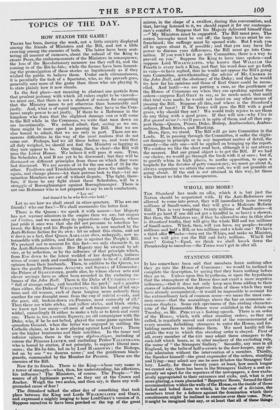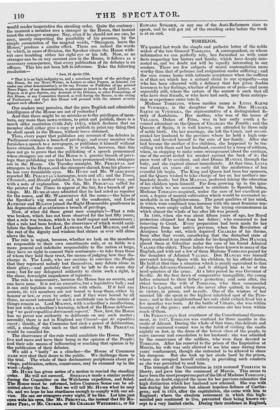STANDING ORDERS.
IT has somewhere been said that members learn nothing after they go into the House of Commons : we would be inclined to complete the description, by saying that they learn nothing before they go in. Unless upon this hypothesis, or upon the hypothesis that the atmosphere of the House does not exert a mere negative influence,—that it does not only keep men from adding to their stores of information, but deprives them of those which they may have already accumulated,—it would be impossible to account for the extraordinary lack of common sense—we mean the most com- mon sense—that the assemblage above the bar on numerous oc- casions displays. Some rich specimens of this abiding character- istic of the Honourable House were exhibited in the debate on Tuesday, on Mr. PERCEVAL'S fasting-speech. There is an order of the House, which, with other standing orders, as they are called, is regularly moved and carried at the commencement of every session, forbidding strangers to enter the House, and for- bidding members to introduce them. We need hardly tell the public the way in which this standing order is obeyed. First of all, every member of the 658 may admit three strangers to the cock-loft which bears, as in utter mockery of the excluding rule, the name of "the Strangers' Gallery." Secondly, any man in all England, by the bribe of half-a-crown to the door-keeper, may ob- tain admission without the intervention of a member. Thirdly, the Speaker himself—the great expounder of the orders, standing and lying—may admit any one he sees &below the Strangers' Gal- lery. Lastly, for these twenty years at least, how much longer we cannot say, there has been in the Strangers' Gallery a seat ex- pressly set apart for the reporters of the newspapers, a door exclu- sively appropriated to their entrances and exits, and, what is. yet more glaring, a room placarded "Reporters' Room," formed for their accommodation within the walls of the House, on the inside of those locked and bolted doors to which, in the case of a division; the members trust for a defence against the domination, which their constituents might be inclined to exercise over their votes. NOW, it might be imagined that nay, or at least that all of these things Woula renaer inoperative the stanaing order. Quite the contrary : the moment a member sees a stranger in the House, that instant must the stranger scamper. Nay, even if he should not see one, he may, merely suspecting the possibility of his presence, by the simple enunciation of the magical words, "Strangers, leave the House," produce a similar effect. These are indeed the words by which, in cases of division, the Speaker clears the House with- out once troubling either his right eye or his left. Now, as no stranger can be on any account seen in the House, it follows as a necessary consequence, that every publication of its debates is an offence. This has not been left to inference. Take the following resolution- " Jovis,13 Aprilis 1738.
"That it is an high indignity to, and a notorious breach of the privilege of, this House, for any News-Writer, in Letters or other Papers, as minutes (or under any other denomination), or for any Printer or Publisher of any printed News Paper, of any denomination, to presume to insert in the said Letters, or Papers, or to give therein, any Account of the Debates, or other Proceedings of this House, or any Committee thereof, as well during the Recess, as the sitting of Parliament; and that this House will proceed with the utmost severity against such offenders."
Our readers may perceive, that the pure English and admirable intelligence of the House are not of yesterday! And that there might be no mistake as to the privileges of mem- bers, any more than news-writers, to print and publish, there is a much older resolution (13th July 1641), which declares that no • member shall either give a copy or publish in print any thing that he shall speak in the House, without leave obtained. Thus, every paper that publishes any account of the debates in Parliament commits a breach of privilege; and every member who furnishes a speech to a newspaper, or publishes it himself without leave obtained, does the same. It is evident, however, that this does not go to prove that the publishing of a speech pronounced when strangers are out of the House is a greater breach of privi- lege than publishing one that has been pronounced when strangers are in the House. On Tuesday sennight, Mr. PERCEVAL saw strangers in the House, and the strangers shrunk from his glance— he has very formidable eyes. Mr. HUME and Mr. WA.RBURTON reported Mr. PERCEVAL'S harangue, texts and all ; and the Times, Chronicle, and Herald published it, the last in a modest way, and with a note of explanation. On this, Mr. PERCEVAL called for the printer of the Times to appear at the bar, for a breach of pri- vilege. Mr. HUME at once admitted that he had acted as reporter for the nonce, and Mr. WARBURTON did the same ;—the hairs of the Speaker's wig stood on end at the confession, and Lords ALTHORP and MILTON joined the Right Honourable gentleman in his deprecation of so atrocious a breach of privilege. Now, of what did these great men complain ?—That a rule was broken, which has not been observed for the last fifty years; that a rule was broken, which is in itself unjust and unnecessary; that a rule had been broken, the observance of which would anni- hilate the Speaker, the Lord ALTHORP, the Lord MILTON, and all the rest of the dignity and wisdom that shines or ever will shine above the bar.
The rule is unjust, because, whether we look on the members as responsible to their own constituents only, or as liable to a more general and indefinite responsibility to the nation at large, they have no right to conceal their sentiments—to take from those of whom they hold their trust, the means of judging how they dis- charge it. The Lords, who are anxious to convince the People that they represent nobody but themselves, may debate alone in their glory,—and probably they will be left to do so sonic day soon; but for any delegated authority to claim such a right, is the sheer, downright impudence of injustice. The rule is unnecessary, because the House has no secrets, and can have none. It is not an executive, but a legislative bony; and it can only legislate in conjunction with others. If it had any secrets, its 658 members are not bound to keep them, either by honour or law, or even by order; and if they were bound by all three, no secret intrusted to such a multitude can in the nature of things remain so. Lord MILTON, with a schoolboy's recollections, but not with a schoolboy's learning, talked of the House deliberat- ing "ne quid revubli ca dein* menti caperet." Now, first, the House has no power nor authority to deliberate on any such matter; secondly, there is not in England any Consul—qui de republica curet; thirdly, if the Commons had such a power of deliberation, still, a standing rule such as that enforced by Mr. PERCEVAL would be uncalled for.
The observance of the rule would annihilate the House. They live and move and have their being in the opinion of the People; and their sole means of influencing or reaching that opinion is by the publication of their debates.
We add a " lastly " as a clincher—the House of Commons DARE NOT shut their doors to the public. We challenge them to the trial. The whole of their declamatory periphrasis about pri- vilege, publication, orders, 'connivance, may be summed up in the word—fudge. -Mr. HUME has given notice of a motion to rescind the standing order. He will not succeed. SHERIDAN made a similar motion during the Committee on the Walcheren expedition, and failed. The House must be reformed, before Common Sense can be ad- mitted above the bar. But we will tell Mr. HUME what he may do, and we hope he has sturdiness enough to comply with our ad- vice. He can see strangers every night, if he like. Let him just open wide his eyes, like Mr. P.ERCEvAL, the instant that Sir Ro- BERT PEEL, OT Mr. CROXER, Or Sir CHARLES WETHERELL, OT Sir EDWARD SUGDEN, or any one of the Anti-Reformers rises to speak, and he will get rid of the standing order before the week is at an end.



























 Previous page
Previous page